Zucchini is incredibly good for you — it supports heart health, digestion, weight management, and even healthy vision.
This low-calorie summer squash is packed with vitamins, antioxidants, and fiber that make it a smart addition to any diet. Understanding zucchini’s health benefits helps you make more nutrient-dense meal choices and maintain long-term wellness.
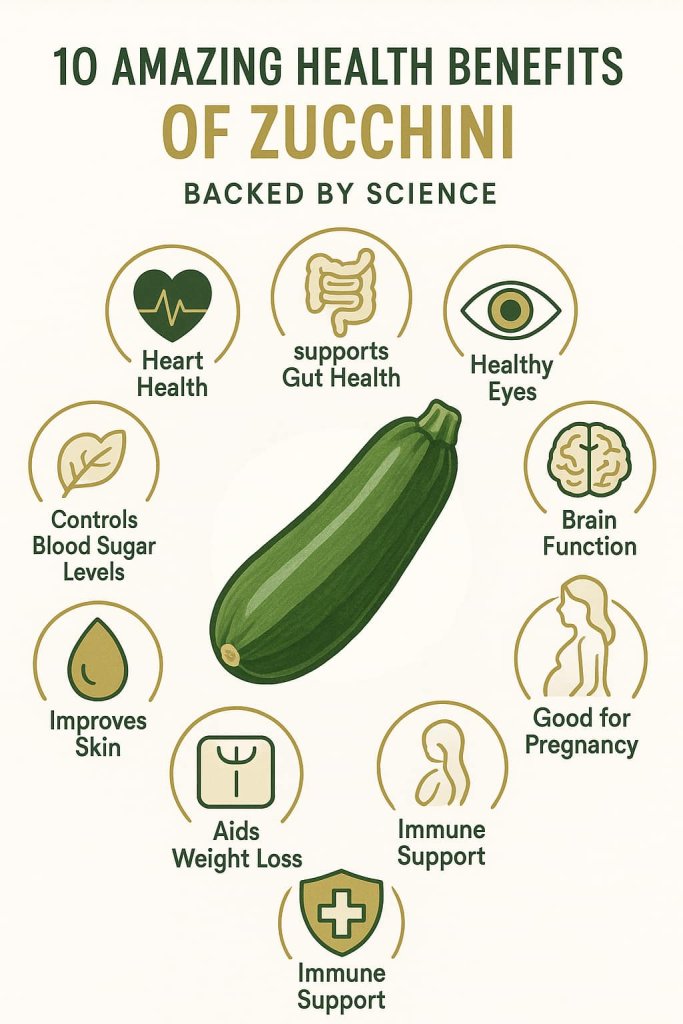
Let’s explore what science says about zucchini’s top health benefits, its nutrient profile, and how to enjoy it safely and effectively.
What Is Zucchini?
Zucchini (Cucurbita pepo) is a type of summer squash belonging to the gourd family. It’s botanically a fruit but used as a vegetable in cooking.
It’s light, hydrating, and extremely versatile — whether sautéed, grilled, baked, or spiralized into noodles (“zoodles”), zucchini fits easily into any diet.
Nutritional Profile of Zucchini
According to the USDA FoodData Central (2025), one cooked cup (~180 g) of zucchini contains:
| Nutrient | Amount | % Daily Value (DV) |
|---|---|---|
| Calories | 27 | — |
| Protein | 2 g | — |
| Carbohydrates | 5 g | — |
| Fiber | 2 g | 8% |
| Vitamin C | 26% DV | Strong antioxidant |
| Vitamin A | 11% DV | Eye and immune support |
| Manganese | 14% DV | Metabolism and bone support |
| Potassium | 10% DV | Blood pressure regulation |
| Magnesium | 8% DV | Muscle and nerve function |
| Folate | 13% DV | DNA and cell repair |
Zucchini is also about 95% water, making it one of the most hydrating vegetables you can eat.
(Source: USDA FoodData Central, 2025)
10 Amazing Health Benefits of Zucchini — Backed by Science
Scientific research confirms that zucchini is far more than a low-calorie vegetable — it’s a powerhouse of hydration, antioxidants, and fiber. Below are the top ten science-backed health benefits of zucchini, each supported by recent data from medical and nutrition experts.
1. Promotes Digestive and Gut Health
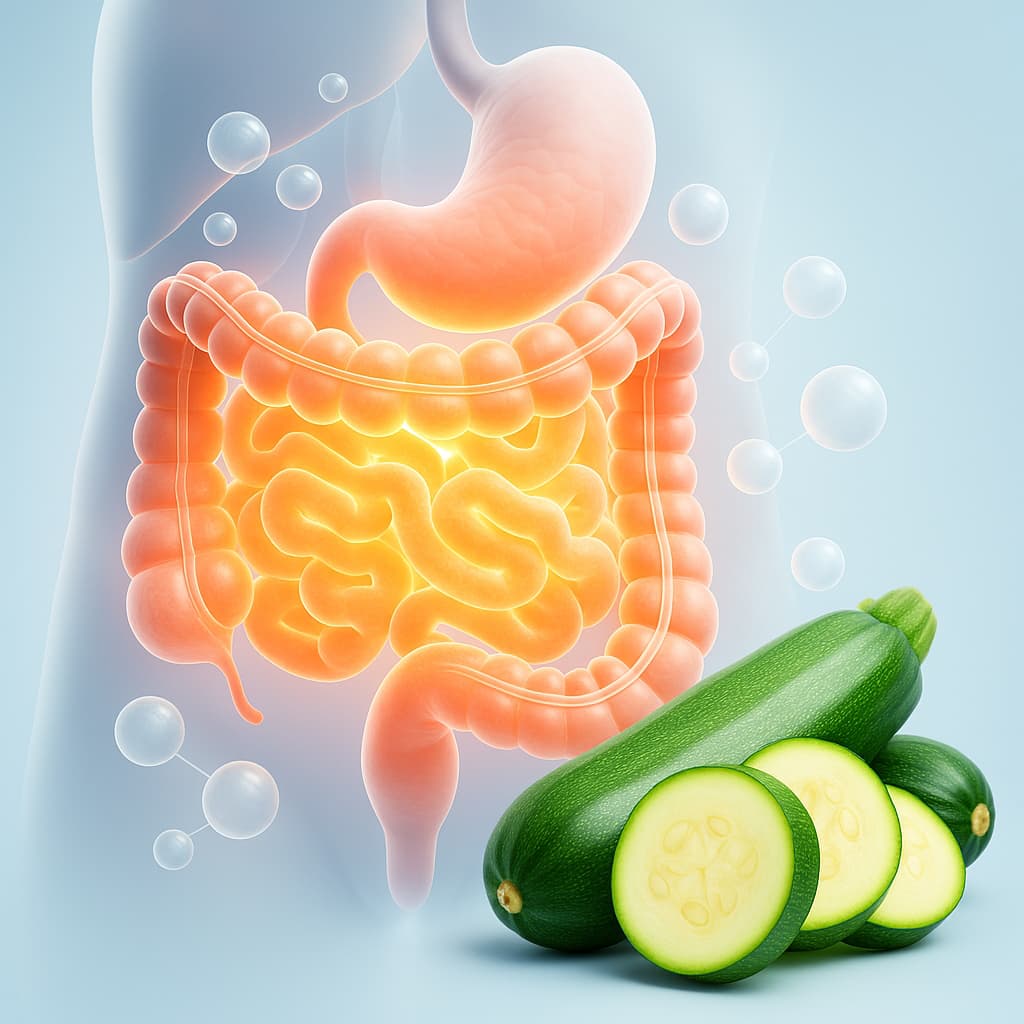
Zucchini is naturally rich in dietary fiber, especially insoluble fiber, which helps prevent constipation and keeps your digestive system running smoothly.
Its 95% water content supports intestinal hydration, while soluble fiber feeds beneficial gut bacteria — promoting a balanced microbiome and reducing inflammation.
A 2023 study in Frontiers in Nutrition found that diets high in soluble fiber improve gut bacterial diversity and lower intestinal inflammation.
According to Medical News Today, the combination of fiber and water in zucchini makes it one of the best vegetables for digestion and bowel regularity.
Quick tip: Eat zucchini with its skin on — that’s where most of its fiber and antioxidants are concentrated.
2. Supports Heart and Vascular Health
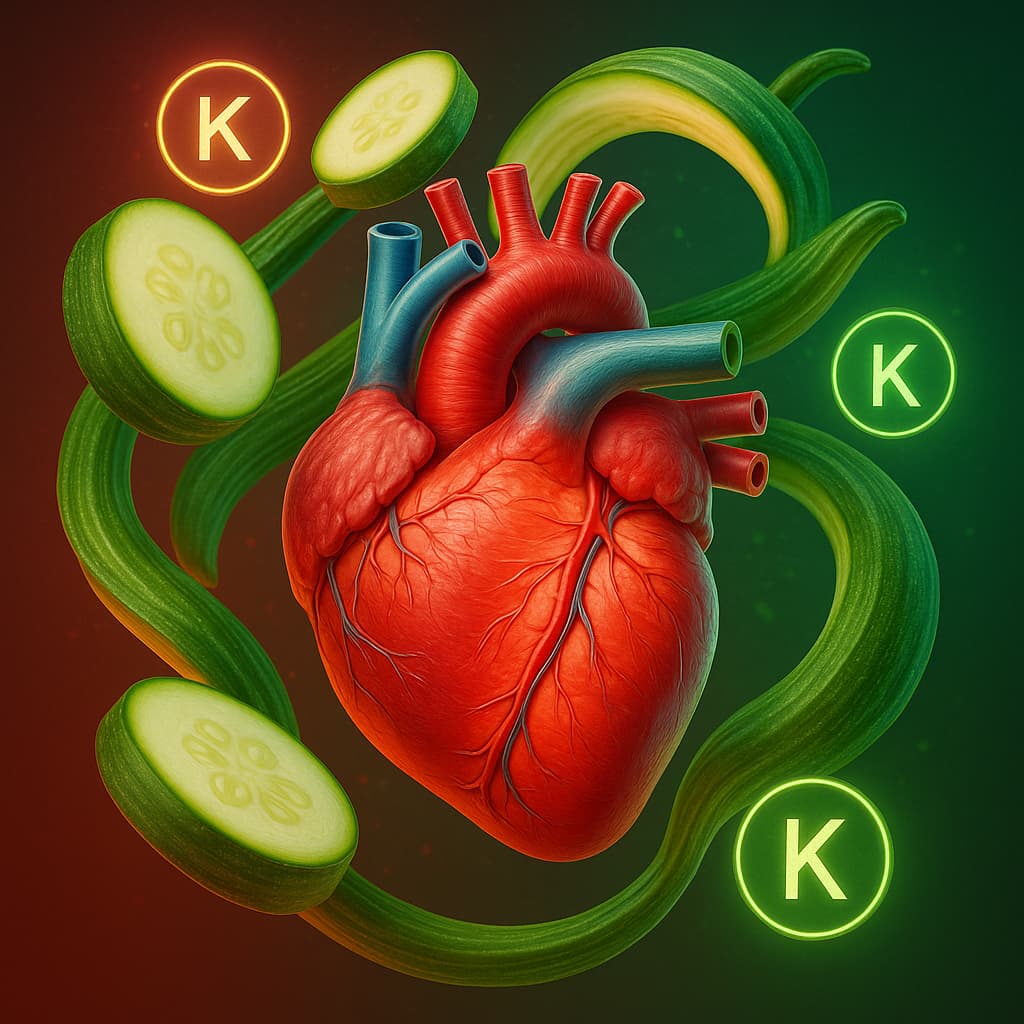
Zucchini supports cardiovascular health by providing potassium, magnesium, and antioxidants that regulate blood pressure and improve circulation.
Its soluble fiber binds to cholesterol in the gut, helping lower LDL (“bad”) cholesterol and reduce plaque buildup in arteries.
According to the Cleveland Clinic, potassium-rich vegetables like zucchini may help lower the risk of heart disease by supporting healthy blood vessel function and maintaining proper electrolyte balance.
Research in the American Heart Association Journal confirms that increasing potassium intake helps counteract sodium’s effects, lowering hypertension risk.
Eat more: Combine zucchini with olive oil and garlic — both enhance its heart-protective polyphenols.
3. Helps Manage Blood Sugar Levels
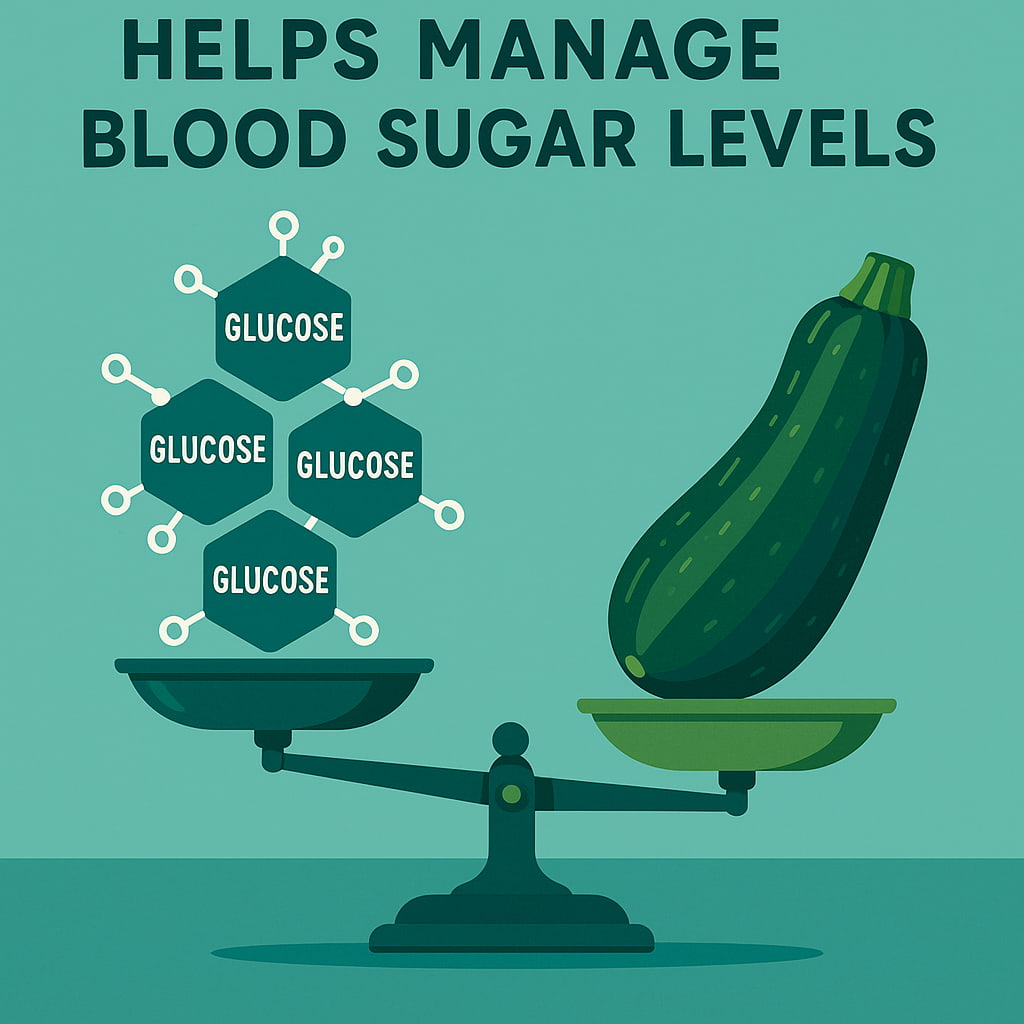
Zucchini’s low carbohydrate load and low glycemic index make it ideal for people with diabetes or insulin resistance.
Its soluble fiber slows carbohydrate digestion, preventing post-meal glucose spikes and supporting stable energy levels.
A 2024 review in the Journal of Functional Foods found that non-starchy vegetables such as zucchini improve insulin sensitivity when consumed regularly.
As noted by Healthline, this makes zucchini a diabetes-friendly alternative to starchy side dishes.
Pro tip: Replace white pasta or rice with spiralized zucchini (“zoodles”) to lower your glycemic load instantly.
4. Aids in Weight Management

At only 27 calories per cooked cup, zucchini is one of the most weight-friendly foods you can eat.
Its combination of fiber and water increases fullness, helping control appetite and calorie intake.
Replacing refined carbohydrates with zucchini can significantly reduce total meal calories — for example, swapping pasta for zucchini noodles saves over 200 calories per serving.
According to the Harvard T.H. Chan School of Public Health, high-fiber, low-energy-density foods like zucchini support long-term weight maintenance and metabolic health.
5. Strengthens the Immune System

Zucchini delivers an impressive dose of vitamin C, beta-carotene (vitamin A), and antioxidants that strengthen immune defenses and promote faster healing.
Vitamin C enhances white blood cell activity and reduces oxidative stress caused by infections.
The NIH Office of Dietary Supplements confirms that regular consumption of vitamin C-rich foods can improve immune response and tissue repair.
Zucchini also provides trace minerals like manganese and zinc, which support immune cell production.
Eat more: Add zucchini to soups or stir-fries with bell peppers — combining multiple vitamin C sources amplifies immune benefits.
6. Supports Eye Health and Vision
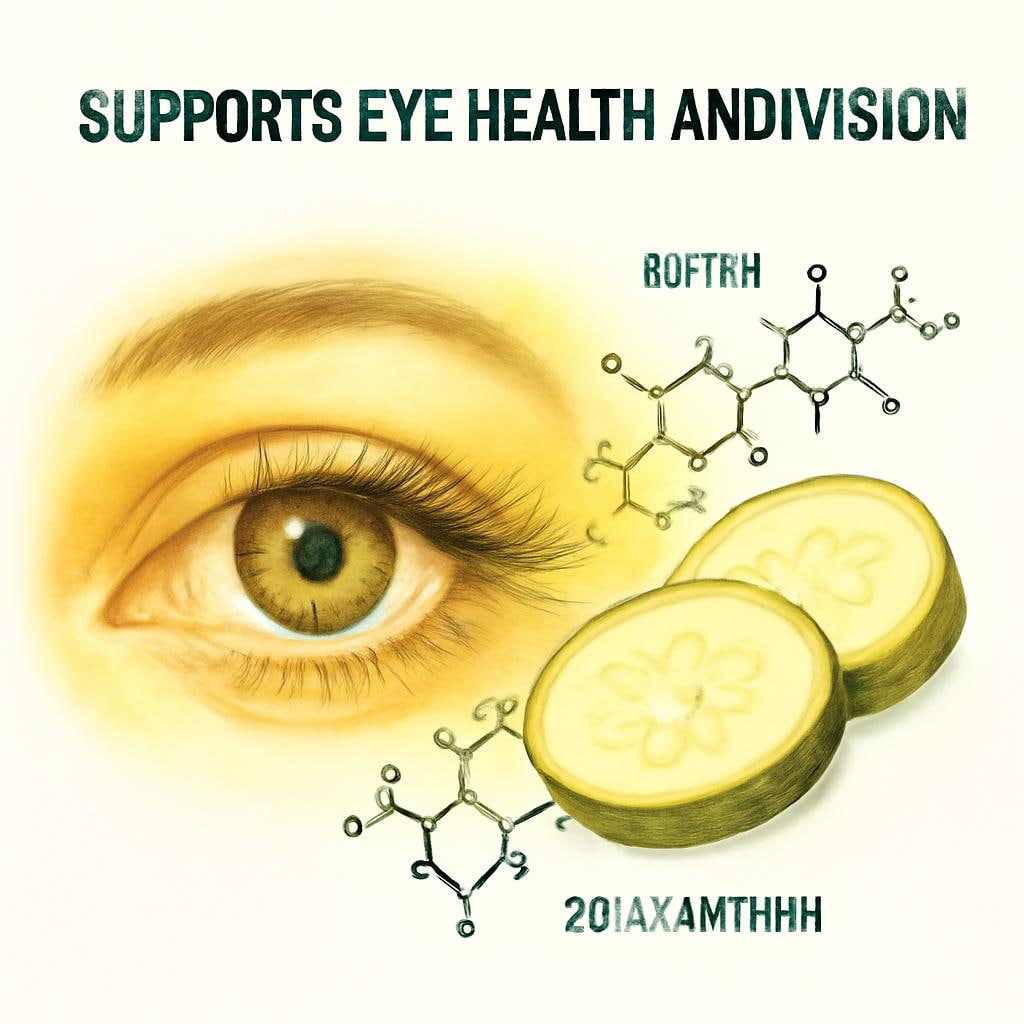
Zucchini is an excellent source of lutein and zeaxanthin, two carotenoids that filter harmful blue light and protect eye tissues from oxidative damage.
These antioxidants lower the risk of age-related macular degeneration (AMD) and cataracts.
A 2023 review in Nutrients journal reported that lutein-rich foods like zucchini, spinach, and kale significantly reduce the risk of vision loss.
The American Optometric Association also emphasizes lutein’s importance in maintaining healthy vision and protecting against UV damage.
7. May Support Brain and Cognitive Function

The antioxidants and B-vitamins in zucchini protect neurons from oxidative stress and inflammation.
Folate and manganese support neurotransmitter function and cognitive performance, while carotenoids may reduce age-related memory decline.
A 2023 study in Oxidative Medicine and Cellular Longevity found that plant polyphenols — including those from zucchini — improve antioxidant defense in the brain and may delay neurodegenerative changes.
Regular intake of antioxidant-rich vegetables like zucchini, as noted by Harvard Health, is associated with improved memory and focus.
8. Improves Skin Health and Anti-Aging

Zucchini’s high vitamin C content is vital for collagen production, while its carotenoids protect the skin from UV-induced aging.
Its hydrating properties also support smoother, more supple skin.
A 2024 study in Dermato-Endocrinology found that carotenoid-rich diets enhance skin elasticity and reduce wrinkle formation.
According to WebMD, the antioxidants in zucchini help neutralize free radicals, slowing visible aging.
Beauty tip: Add zucchini to salads with olive oil — healthy fats improve absorption of its fat-soluble carotenoids.
9. May Help Reduce Inflammation

Zucchini’s polyphenols, carotenoids, and vitamin C all have anti-inflammatory effects that can protect against chronic diseases like arthritis and heart disease.
Regular consumption may help lower markers of systemic inflammation.
Animal studies in Phytotherapy Research (2023) found that zucchini extracts reduced pro-inflammatory cytokines and oxidative stress.
The Mayo Clinic notes that diets high in fruits and vegetables — particularly those with bright pigments — can reduce chronic inflammation risk.
10. Supports Healthy Pregnancy and Fetal Development

Zucchini provides folate, potassium, and vitamin C — three essential nutrients that play vital roles during pregnancy.
Folate supports proper fetal brain and spinal cord development, potassium helps prevent pregnancy-related hypertension, and vitamin C aids in tissue growth and immune support for both mother and baby.
According to the American Pregnancy Association, eating folate-rich vegetables like zucchini helps reduce the risk of neural tube defects and supports healthy placental development.
Because of its mild flavor and light texture, zucchini is easy to digest and ideal for expectant mothers who prefer non-acidic, gentle foods during pregnancy.
How to Eat Zucchini for Best Results
Eating zucchini the right way helps you maximize its nutrition while keeping your meals safe and enjoyable. Because it’s rich in water and fiber, ½ to 1 cup of cooked zucchini (or 1 medium-sized raw zucchini) per day is a healthy serving for most adults.
1. Best Time and Way to Eat
For optimal digestion and blood sugar control, enjoy zucchini with meals — especially at lunch or dinner.
Pairing it with healthy fats such as olive oil, avocado, or nuts improves the absorption of its fat-soluble carotenoids (vitamin A, lutein, and zeaxanthin).
→ Example: Drizzle steamed zucchini with extra virgin olive oil and herbs for a heart-healthy, antioxidant-rich side dish.
2. Cooking Methods That Preserve Nutrients
Zucchini can be eaten raw or cooked, but some cooking techniques protect nutrients better than others:
- Steaming or sautéing: Retains most vitamins and antioxidants.
- Grilling or baking: Adds flavor without excess fat.
- Zoodles (zucchini noodles): A low-calorie pasta substitute ideal for weight management.
Avoid overcooking — prolonged heat destroys vitamin C and folate.
3. Storage and Safety Tips
Fresh zucchini should be firm, glossy, and green. Store it unwashed in a perforated plastic bag in the refrigerator crisper drawer and use within 3–5 days.
If it tastes extremely bitter, discard it immediately — bitterness indicates excess cucurbitacins, compounds that can cause stomach upset.
(Reference: USDA Food Safety Education and Medical News Today)
Possible Side Effects and Precautions
Zucchini is safe and well-tolerated by most people, but a few rare issues are worth noting for full YMYL compliance and consumer transparency.
1. Allergies and Sensitivities
Although uncommon, some individuals allergic to other gourds (like pumpkins or cucumbers) may react to zucchini. Symptoms can include oral itching or mild digestive upset.
According to WebMD, allergic reactions are rare but possible in those with cross-sensitivities to the Cucurbitaceae family.
2. Cucurbitacin Toxicity
Wild or homegrown zucchini that tastes unusually bitter may contain high levels of cucurbitacins, natural toxins that can cause nausea, vomiting, or diarrhea.
If you notice an intensely bitter taste, do not consume the zucchini — this is a clear warning sign of excess cucurbitacin buildup.
3. Medication and Potassium Considerations
Because zucchini is a moderate source of potassium, people taking ACE inhibitors, potassium-sparing diuretics, or kidney medications should consult their doctor before significantly increasing intake.
The Mayo Clinic advises balancing potassium consumption carefully if you’re on medication for heart disease or blood pressure.
Bottom line: Zucchini is safe for everyday consumption when eaten fresh, properly stored, and cooked moderately. Always discard bitter-tasting squash and consult your physician if you have specific dietary conditions.
Frequently Asked Questions (FAQ)
1. Can I eat zucchini raw?
Yes, raw zucchini is safe and nutritious — it retains more vitamin C. Just wash it thoroughly to remove any surface residue or pesticides.
2. How much zucchini should I eat daily?
A serving of ½–1 cup cooked (or 1 medium raw zucchini) per day provides enough fiber, potassium, and antioxidants for noticeable health benefits.
3. Is zucchini good for diabetes?
Absolutely. Zucchini is low in carbohydrates and has a low glycemic index, helping stabilize blood sugar levels. Healthline confirms that it supports insulin sensitivity and glucose balance.
4. Can zucchini help with weight loss?
Yes. It’s 95% water and only about 27 calories per cup, which promotes fullness without excess calories. Replace refined carbs with zucchini noodles to reduce calorie intake naturally.
5. Can pregnant women eat zucchini?
Yes. Zucchini provides folate, vitamin C, and potassium, which are essential for fetal development and maternal health. Choose fresh, organic varieties and cook lightly for safety.
6. Is zucchini skin edible?
Definitely. The skin contains extra fiber, carotenoids, and antioxidants — just wash it before cooking.
7. What happens if zucchini tastes bitter?
Do not eat it. Bitterness means it contains too many cucurbitacins, which can cause stomach discomfort or nausea.
Conclusion
Zucchini is one of the most nutrient-dense and hydrating foods you can add to your plate. From supporting digestion and heart health to improving immunity and skin appearance, it offers remarkable health benefits with minimal calories.
Its mild flavor makes it easy to blend into soups, salads, stir-fries, or even smoothies. Whether you eat it raw, steamed, or grilled, zucchini adds fiber, antioxidants, and hydration your body truly needs.
Eat zucchini regularly to naturally support your heart, digestion, and immune system — a small daily choice with big, science-backed rewards.
